2 - Corruption and Later Stuart State Trials
Published online by Cambridge University Press: 14 January 2023
Summary
As well as prosecuting political and religious dissent, later Stuart state trials also targeted corrupt ministers who had been the subject of parliamentary investigations and were subsequently impeached for ‘high crimes and misdemeanours’. Indeed, as Lord Mansfield observed when passing judgement on a corruption case in 1770 and reflecting back on the previous two hundred years, ‘there hardly ever is an impeachment against a minister where the charge is not for receiving money for procuring a grant from the king’. The process of impeachment had been revived in 1621 specifically to deal with corruption allegations against Lord Chancellor Bacon and the device was frequently used thereafter. It became a potent weapon during the Restoration and was repeatedly used until 1725 when a Lord Chancellor, Macclesfield, was again tried in parliament for corruption. This chapter investigates these trials both in order to show how frequently issues of financial corruption were part of impeachments in the period after the Glorious Revolution and to reflect in turn on what these trials tell us about the nature of corruption more generally in this period. Later sections of the chapter analyse the defence arguments employed by the accused, highlighting how appeals to custom and to the letter of the law, as well as attempts to redefine bribes as ‘gifts’ or ‘presents’, were deployed both as a reflection of blurred conceptual boundaries and as a way of neutralising allegations of corruption. Misbehaviour was represented in such defences in terms of norms of friendship, the personal nature of office-holding or cultural factors, and these arguments were symptomatic of those deployed in many other attempts to grapple with early modern corruption. The cases therefore illustrate the difficulties involved in prosecuting this most slippery of crimes, as well as the extent to which its definition was problematic and contested. A concluding section reflects on how successful state trials were in prosecuting corruption cases and what such cases reveal about state trials as a genre. In the opening section, however, the chapter lays out the nature and extent of the prosecutions, showing that state trials were, by their nature, very frequently politicised, and that they were a very blunt way to tackle corruption.
- Type
- Chapter
- Information
- Publisher: Boydell & BrewerPrint publication year: 2021
- 1
- Cited by



